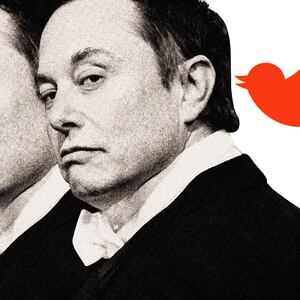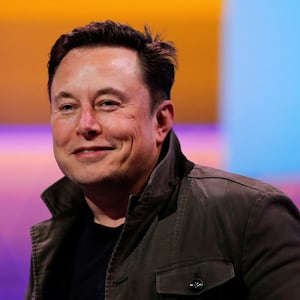On Thursday, The Guardian published an interview with Olena Zelensky, the first lady of Ukraine, during which she addressed an unlikely topic: Elon Musk’s role in Eastern Europe, where his Starlink internet service has become increasingly central to Ukraine’s war effort. Gently upbraiding the tech-mogul for previously advocating that Ukraine cede territory to Russia in exchange for peace, the first lady expressed gratitude for Starlink, but suggested Musk’s allegedly pro-Kremlin views on Crimea were a product of ignorance. “Let’s be honest, even the smartest person can’t say the smartest thing 24 hours a day,” she said.
Of course, Zelensky is not the first person to question Musk’s intelligence of late, especially after the September release of his texts as part of a lawsuit over his Twitter bid. In The Atlantic, Charlie Warzel wrote that the brouhaha over Twitter shattered the myth of Musk’s genius, while Sarah Jeong, an editor at The Verge, quipped on Twitter that his texts “make him look dumb as hell.” The billionaire’s official acquisition of Twitter this week only intensified those sentiments. Disinformation reporter Ali Breland wrote in Mother Jones Thursday that Musk’s twiddling with Twitter reveals the tech guru to be “dumb,” and that Musk is “is making one of the clearest cases that meritocracy is a myth.”
In a way, these accusations are not surprising. The media has long portrayed Musk as an impulsive man-child who holds no creed but chaos, always just a bong-rip away from his next blunder. And viewed in isolation, many of Musk’s decisions and preoccupations—from his fixation with colonizing Mars to his “free speech absolutism”—could seem immature or irrational to a casual observer.
Yet, as someone who has followed Musk closely for years, I think his actions are not as mercurial as they seem. In fact, even Musk’s most impulsive decisions and oddball ventures begin to make sense when you realize that they are all a reflection of his deepest held aspiration, one he secretly values above all others: preventing the extinction of the human race.
Although the media has often dismissed Musk’s musings on existential risk as the boyish enthusiasm of a science-fiction obsessed megalomaniac, for years the billionaire has steadfastly and repeatedly maintained that his only goal in life is to prevent human extinction by making life multi-planetary. Indeed, if Musk’s fixation on human extinction is a secret, it is not because he hides it, but because few in the media seem to take him at his word when he says that saving humanity is all he cares about.
And he puts his money where his mouth is. Quietly, the Tesla co-founder is one of the biggest donors to human extinction research in the world, lavishly funding university think tanks in the U.S. and the U.K. that study existential risk. He even sits on the scientific advisory board of the Boston-based Future of Life Institute, an organization focused on saving our species.
Here, Musk is not alone. These think tanks—particularly Cambridge’s Centre for the Study of Existential Risk and Oxford’s Future of Humanity Institute—derive much of their funding not from traditional academic sources, but from billionaires and tech moguls. This includes not just Musk, but other folks like Dustin Moskovitz (co-founder of Facebook), Jaan Tallinn (formerly of Skype), Len Blavatnik (a former USSR oil magnate), Yuri Milner (an Israeli billionaire venture capitalist), and a slew of other preposterously wealthy individuals.
Ostensibly, the fact that these university think tanks are being well funded to study existential risk sounds like a good thing—right? Human extinction would not be rad, and we should research its prevention. But if you dig into the work coming out of these institutes, some disturbing ideas come to light. Many of the scholars affiliated with these think tanks subscribe to a strange and at times unsettling ethical philosophy called “longtermism.”
Growing out of the booming “effective altruism” movement, longtermists assign an overwhelming moral importance to the distant future, and maintain that we must prioritize far-future human beings—who will live millennia or even millions of years hence—in our present-day decision making. The philosopher Émile Torres has written a thorough audit of the dangers of longtermism, noting that adherents to the philosophy are often blithely dismissive of any problems—even really, really bad ones—that fall short of threatening human extinction.
For example, from a longtermist point of view, catastrophic climate change, an increasingly likely future, is unlikely to cause human extinction, even if it leads to the death of millions or billions around the world. It is therefore a less morally pressing priority than preventing the rise of species-ending malevolent artificial intelligence, even if the latter is a much less likely outcome.
In addition to being wantonly dismissive of serious societal threats, many longtermists are also willing to embrace extreme “solutions” in the name of mitigating any and all risks to our species. Of particular concern to existential risk scholars is the possibility that technological “progress” will make it increasingly easy for lone wolf actors to create civilization-ending doomsday devices, such as novel bioweapons. In a famous 2019 essay, Nick Bostrom—a leading philosopher of existential risk at Oxford—argued that the only way to prevent such an eventuality is through mass surveillance. He even speculated that it may one day be necessary for every man, woman, and child on Earth to wear an “advanced appliance, worn around the neck and bedecked with multidirectional cameras and microphones.” In a stroke of Orwellian genius, Bostrom suggested calling these human dog collars “freedom tags,” and the police who attend to them “freedom officers” working at “patriot monitoring stations.”
These sci-fi tinged philosophical fever dreams might be amusing were the stakes lower, or its adherents confined to the ivory tower. As it stands, however, Bostrom’s work has had a massive influence on the longtermist community, and his extremist philosophy is spoken about favorably by billionaires like Bill Gates, Peter Thiel, and—of course—Elon Musk.
Yet, most of the media still tends to treat Musk’s engagement with these philosophies as silly flirtations. A op-ed in The Guardian published last week analyzed the tech mogul’s embrace of longtermism, concluding that “Musk is unserious but toying with dangerous ideas.”
I would also argue that promulgating the narrative that the world’s richest man is just “toying” with these ideas rather than living his life in accordance with them is profoundly dangerous.
For years, Musk has been telling us where his priorities lie: securing the future of the human race by making intelligent life multi-planetary. He has praised longtermist ideas, donated millions to longtermist causes, and his two largest companies—Tesla and SpaceX—are both aimed at securing a long-term human future through green technologies and space colonization. Musk was in conversation with longtermist William MacAskill during his bid to buy Twitter. From those texts we know that the philosopher introduced Musk to Sam Bankman-Fried, another billionaire longtermist who viewed transforming Twitter into a free speech haven as part of his goal to “make the long-term future of humanity go well.”
Given everything we now know about Musk’s priorities as well as those of the people he was talking to during his decision to buy Twitter, it is worth wondering how exactly owning the largest bullhorn on the internet fits into the billionaire’s grander ambitions for our species’ future security. Although outside observers view his acquisition of the social media company as a sideshow from his loftier pursuits, Musk has been clear that he sees this new Twitter chapter as a continuation of his work to safeguard humanity: “The reason I acquired Twitter is because it is important to the future of civilization,” he told Yahoo Finance.
At the very least, Musk now has a very large platform to proselytize his longtermist ideas, and the means to censor or elevate voices—including political figures and others with real power—who do or do not subscribe to his futurist crusade. His recent entrance into foreign policy and his ability to shake the geopolitical landscape with a single tweet show that he is more than willing to use the technologies he controls to intervene unilaterally in world politics when he perceives an existential crisis.
Case in point, Musk’s meddling in Ukraine has shown that his commitment to longtermism is deeper than rhetoric or a few million bucks donated here or there. In early October, the SpaceX CEO blocked Starlink in Crimea out of concerns that any successful Ukrainian counteroffensive into that territory would risk nuclear war. He warned that if we do not engage in negotiations with Russia, we are on the path to a conflict that will mean “civilization is over.” He has since spoken on and off about removing Starlink from Ukraine entirely. While he has agreed to keep funding the satellite internet service for now, his previous comments suggest that he could take Starlink offline at any given moment to hamstring the Ukrainian military and taper back whatever risk of nuclear war he believes is too high.
To lay my own cards on the table, I actually happen to share Musk’s concern that the West is hurtling toward nuclear confrontation with Russia, and that the Biden administration has thoughtlessly embraced a hawkish and inept interventionist policy. Like Musk, I also believe that unpalatable compromises over Ukrainian territory are probably the only way to prevent a metastasizing world war.
Yet, the question is not whether Musk is right in this particular instance, but about what it means for the world’s richest man to be directly interfering in the foreign policies of democratically elected governments.
With Musk’s interference in Eastern Europe, we have entered a brave new world: one where a man guided by longtermist ideals seems willing to take it upon himself to save the planet from nuclear Armageddon. As we move into an increasingly imperiled 21st century—and as longtermism grows increasingly popular among a wider cross section of the elite—we have every reason to be concerned that Musk’s dalliances might be a minor prologue of what’s to come.








